In light of the recent incident at Liverpool Women’s Hospital, many healthcare facilities have found themselves reassessing their own security measures. In the wake of this event, many questions have been raised – particularly, what can hospitals be doing to best protect the patients, staff, and visitors inside their building at any given time? Hospitals are now considering new security systems to enhance safety amidst constant technological advancements. This incident has acted as a wake-up call for many, with the NHS providing new guidance for healthcare facilities that encourages the review and upgrading of security systems across the board.
This blog is a succinct guide to the basics of healthcare security, discussing its importance and the best measures that can be taken to keep hospitals and clinics safe. For personalised advice regarding security installation, contact AI Security for a consultation today.
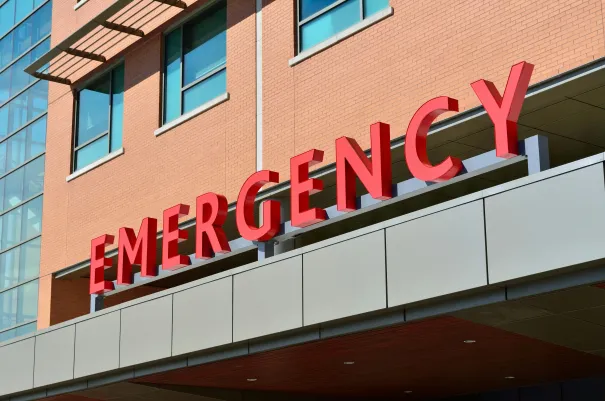
The Importance of Hospital and Healthcare Security
Healthcare facilities are in a uniquely vulnerable position when it comes to security, yet effective safety measures are absolutely vital for hospitals and clinics. Particularly with the added difficulties of the pandemic, it is currently more important than ever that all healthcare facilities are fitted with the absolute best security installations available. Read on to discover our recommended security measures and why they are an imperative addition for maintaining a safe environment in healthcare premises.
What Unique Challenges Do Healthcare Facilities Face?
For healthcare facilities, adequate security is both absolutely vital and especially tricky to handle. Healthcare providers play a crucial role in implementing effective security measures to tackle these challenges. With such large premises and a significant number of visitors passing through every single day, there are plenty of security threats faced by hospitals, medical centres, and other healthcare clinics every single day.
Hospitals have a wide range of expensive equipment on site that need to be protected, all whilst ensuring that the safety of patients and staff remains a top priority. Computers, IT equipment, and personal possessions are all a constant factor for healthcare facilities, and it is imperative that high-grade security technology is in place to keep these valuable safe.
Hospital Security Systems
Access Control Systems
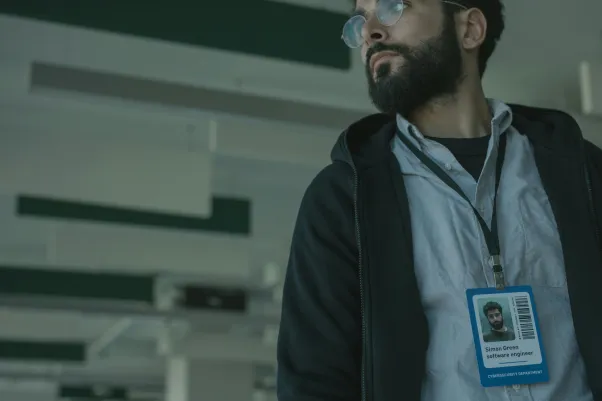
Access control systems are one of the most effective ways you can be monitoring who is coming in and out of your facility. With a wide range of technologies available (ranging from audio systems to PIN passcodes), you can ensure that access to high-risk areas is only granted to those you need. With safety as an obvious priority, a benefit of access control systems is that they can be synced to alarms – ensuring that nobody is trapped behind doors they can’t open in an emergency. These systems protect patients, equipment, departments, and other important assets you need to keep safe. Access control systems can also be effectively integrated with other security solutions to enhance overall safety.
CCTV
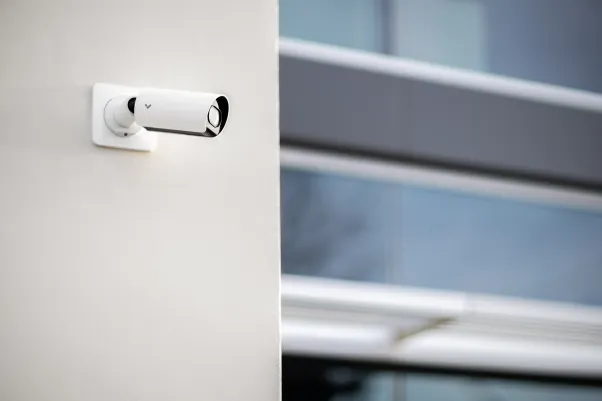
As one of the most common security measures taken, video surveillance systems provide careful monitoring across the entire precinct. Consistent recording and camera presence provide important information about anti-social or criminal events, documenting anything that may happen and giving you potential insight into incidents before they happen. CCTV allows you to notice something going awry before it gets out of control. However, this can be a tricky installation in healthcare facilities, as patient privacy is a factor that needs to be considered when placing cameras.
Alarms
Alarm systems are a key aspect of comprehensive security. With the sheer size of many healthcare facilities, quickly communicating an emergency to everybody inside the building is an imperative task. Not only that, but fire alarms are a legal obligation, so it is essential that you have the alarm installations you need to protect the precinct.
Gates/Barriers
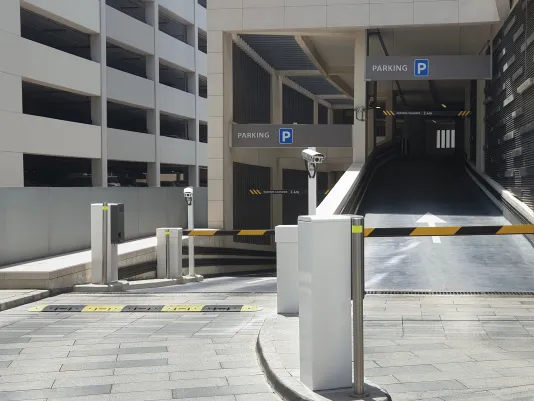
One of the most foundational levels of security a healthcare facility needs to consider is safe gates and barriers. Constructing fencing around the entire precinct allows for a secure border, limiting those coming in and out. Security gates can be adapted to fit the unique needs of healthcare facilities, such as installing gate automation for staff, which ensures entry is simple for those who need it and appropriately measured to limit those who don’t.
Covid Measures
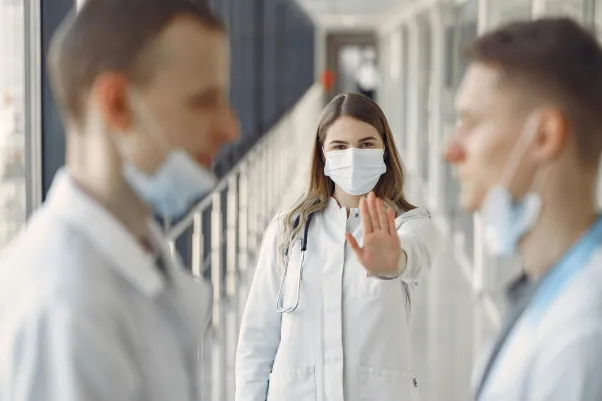
Over the last couple of years, healthcare facilities have had brand new hurdles to overcome. As high-risk sites, it is essential that appropriate security measures are taken to make sure that everybody entering the precinct is monitored and checked in. Systems such as InVentry work as an effective method of visitor management, providing options for temperature checking, presentation of Photo-ID, and keeping a thorough record of everybody who has entered the premises. Not only does this protect healthcare facilities from unwanted exposure, but also provides further security measures across the board.
Call Today for a Consultation
When it comes to healthcare, the safety of every single patient, visitor, and staff member is of utmost importance for patient safety. With the sheer amount of expensive equipment and valuables, these hospitals and other facilities can sadly become a tempting target for many criminals. But, as outlined above, there are many effective security systems you can be installing to leave your facility in the safest position possible.
Call ai security today to discuss what installations and security measures we can be providing to keep your premises secure. The sooner you reach out, the sooner you can rest assured that your hospital or clinic is protected.
SECURE YOUR HOSPITAL OR MEDICAL FACILITY
Hospital Security FAQs
What security measures are in place at the hospital?
Hospitals have many security measures in place to keep patients, staff and visitors safe. These include:
- Surveillance Cameras: Throughout the facility to watch and record.
- Access Control: Restrict access to areas like operating rooms, pharmacies and patient records with keycards, biometrics or PIN codes.
- Security Officers: Trained security guards patrol the hospital and respond to incidents.
- Alarms: Detect unauthorized access, fire or other emergencies and alert security or police.
- Visitor Management: Track who comes into the hospital, often requiring visitors to sign in and wear ID badges.
- Emergency Procedures: Protocols for responding to emergencies, including lockdowns and evacuations.
What is a surveillance system?
A surveillance system in a hospital is the network of cameras and monitoring equipment to watch and record activity in the facility. These help to prevent and detect crime, keep patients and staff safe and provide evidence in case of an incident. Surveillance systems are placed in areas like entrances, hallways, parking lots and high risk areas like the ER.
What is a hospital alarm?
A hospital alarm system has various types of alarms to alert staff to different kinds of emergencies or needs. This includes:
- Fire Alarms: Detects smoke or fire and triggers evacuation.
- Security Alarms: Triggered by unauthorized access or tampering with security systems.
- Panic Alarms: Allows staff to call for help in case of an emergency, like an aggressive patient.
- Medical Alarms: Alerts staff to medical emergencies, like a patient in distress.
What is an ADT system?
An ADT system in a hospital is the Admission, Discharge and Transfer system that tracks patient movement within the facility. It updates patient records in real time so healthcare providers can access current information. This is key to managing patient care, bed availability and overall hospital operations.
What is security in healthcare?
Security in healthcare is the development and implementation of policies, procedures and practices to protect patients, staff, visitors and physical assets.
- Risk Management: Identifying and mitigating security risks.
- Emergency Response: Planning and responding to emergencies like natural disasters, violence or cyber attacks.
- Compliance: Ensuring compliance with laws and regulations like data protection laws.
- Training: Training staff on security protocols and best practices.
What is safety and security in healthcare?
Safety and security in healthcare is the protection of patients, staff and visitors from harm, physical, emotional or environmental. This includes:
- Patient Safety: Medical treatment and care delivered in a way that minimizes risk to patients.
- Workplace Safety: Protecting healthcare workers from injuries, infections and violence.
- Environmental Safety: A clean, safe and secure environment for everyone in the healthcare facility.
- Data Security: Protecting patient information from unauthorized access or breaches.
What is the UK health insurance?
The UK health insurance system is mainly the National Health Service (NHS) which provides free or low cost healthcare to residents funded by taxes. While most healthcare services are free at the point of use, some people choose to take out private health insurance for faster access to treatments or private hospital care. Private health insurance in the UK is an add on to the NHS.
What is the best alarm for the elderly?
The best alarm for the elderly depends on individual needs but popular options include:
- Pendant Alarms: Worn around the neck or wrist, these can be pressed to call for help in an emergency.
- Fall Detection Alarms: These detect falls and alert caregivers or emergency services.
- GPS Trackers: Useful for elderly with dementia, these allow caregivers to track their location.
- Two-Way Communication Alarms: Allows the user to speak to a caregiver or monitoring centre.
What are the types of clinical alarms?
Clinical alarms are used in healthcare settings to alert staff to various conditions or emergencies. Types include:
- Physiological Alarms: Triggered by changes in a patient’s vital signs, e.g. heart rate or blood pressure.
- Technical Alarms: Equipment malfunction or failure, e.g. ventilator issue.
- Emergency Alarms: Immediate life threatening situations, e.g. cardiac arrest (e.g. code blue).
- Reminder Alarms: Scheduled tasks or medication administration times.
Do NHS hospitals have security?
Yes NHS hospitals have security:
- Security Personnel: On site officers who patrol the premises and respond to incidents.
- CCTV Surveillance: Cameras to monitor activity and prevent criminal behaviour.
- Access Control: Systems that restrict access to sensitive areas.
- Alarm Systems: Fire, unauthorized access and other emergencies.
- Visitor Management: Systems to track and manage who is in the hospital.
What is the alert system for hospitals?
The alert system in hospitals is the various alarms and notifications used to communicate emergencies or urgent situations to staff. These include:
- Code Alerts: Specific codes like “Code Blue” for cardiac arrest or “Code Red” for fire.
- Overhead Paging Systems: To announce emergencies, staff alerts or patient related announcements.
- Digital Alerts: Notifications sent via computer systems or mobile devices to inform staff of critical events, e.g. patient deterioration or system failure.
These are key to responding to emergencies and hospital safety.




